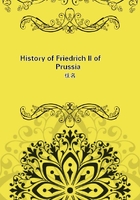
第59章 @@(36)
But this passage of his opening speech is what I recollect best of him there: "Right Reverend Fathers, date operam ut illa nefanda schisma eradicetur," exclaims Sigismund, intent on having the Bohemian Schism well dealt with,--which he reckons to be of the feminine gender. To which a Cardinal mildly remarking, "Domine, schisma est generis neutrius (Schisma is neuter, your Majesty),"--Sigismund loftily replies, "Ego sum Rex Romanus et super grammaticam (I am King of the Romans, and above Grammar)!" [Wolfgang Mentzel, Geschichte der Deutschen, i. 477.]
For which reason I call him in my Note-books Sigismund SUPERGRAMMATICAM, to distinguish him in the imbroglio of Kaisers.
BRANDENBURG IS PAWNED FOR THE LAST TIME.
How Jobst's pawn-ticket was settled I never clearly heard; but can guess it was by Burggraf Friedrich's advancing the money, in the pinch above indicated, or paying it afterwards to Jobst's heirs whoever they were. Thus much is certain: Burggraf Friedrich, these three years and more (ever since 8th July, 1411) holds Sigismund's Deed of acknowledgment "for 100,000 gulden lent at various times:"and has likewise got the Electorate of Brandenburg in pledge for that sum; and does himself administer the said Electorate till he be paid. This is the important news; but this is not all.
The new journey into Spain requires new moneys; this Council itself, with such a pomp as suited Sigismund, has cost him endless moneys. Brandenburg, torn to ruins in the way we saw, is a sorrowful matter; and, except the title of it, as a feather in one's cap, is worth nothing to Sigismund. And he is still short of money; and will forever be. Why could not he give up Brandenburg altogether; since, instead of paying, he is still making new loans from Burggraf Friedrich; and the hope of ever paying were mere lunacy! Sigismund revolves these sad thoughts too, amid his world-wide diplomacies, and efforts to heal the Church. "Pledged for 100,000 gulden," sadly ruminates Sigismund; "and 50,000 more borrowed since, by little and little; and more ever needed, especially for this grand Spanish journey!" these were Sigismund's sad thoughts:--"Advance me, in a round sum, 250,000 gulden more,"said he to Burggraf Friedrich, "250,000 more, for my manifold occasions in this time;--that will be 400,000 in whole; [Rentsch, pp. 75, 357.]--and take the Electorate of Brandenburg to yourself, Land, Titles, Sovereign Electorship and all, and make me rid of it!" That was the settlement adopted, in Sigismund's apartment at Constance, on the 30th of April, 1415; signed, sealed and ratified,--and the money paid. A very notable event in World-History; virtually oompleted on the day we mention.
The ceremony of Investiture did not take place till two years afterwards, when the Spanish journey had proved fruitless, when much else of fruitless had come and gone, and Kaiser and Council were probably--more at leisure for such a thing. Done at length it was by Kaiser Sigismund in utmost gala, with the Grandees of the Empire assisting, and august members of the Council and world in general looking on; in the big Square or Market-place of Constance, 17th April, 1417;--is to be found described in Rentsch, from Nauclerus and the old Newsmongers of the time. Very grand indeed: much processioning on horseback, under powerful trumpet-peals and flourishes; much stately kneeling, stately rising, stepping backwards (done well, ZIERLICH, on the Kurfurst's part);liberal expenditure of cloth and pomp; in short, "above 100,000people looking on from roofs and windows," [Pauli,
Allgemeine Preussische Staats-Geschichte, ii. 14.
Rentsch, pp. 76-78.] and Kaiser Sigismund in all his glory.
Sigismund was on a high Platform in the Market-place, with stairs to it and from it; the illustrious Kaiser,--red as a flamingo, "with scarlet mantle and crown of gold,"--a treat to the eyes of simple mankind.
What sum of modern money, in real purchasing power, this "400,000Hungarian Gold Gulden" is, I have inquired in the likely quarters without result; and it is probable no man exactly knows.
The latest existing representative of the ancient Gold Gulden is the Ducat, worth generally about a Half-sovereign in English.
Taking the sum at that latest rate, it amounts to 200,000 pounds;and the reader can use that as a note of memory for the sale-price of Brandenburg with all its lands and honors,--multiplying it perhaps by four or six to bring out its effective amount in current coin. Dog-cheap, it must be owned, for size and capability; but in the most waste condition, full of mutiny, injustice, anarchy and highway robbery; a purchase that might have proved dear enough to another man than Burggraf Friedrich.